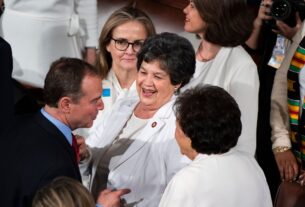A potential breakthrough arrived earlier this month in California’s years-long debate over ethnic studies, in which Jewish groups fought to ensure that a curriculum mandate would not lead to teachers presenting Jews unfairly or singling out Israel. For the first time, influential lawmakers from several racial and ethnic caucuses offered to help the effort — as long as ethnic studies did not draw exclusive scrutiny.
The result is a collaboration between the state legislature’s Jewish Caucus and the chairs of the Black, Latino, and Asian American and Pacific Islander caucuses on a bill to address concerns about antisemitism throughout the state’s education system.
“There was a level of ownership around ethnic studies by folks that are in those ethnic communities, and nervousness that in our desire to prevent antisemitism in that discipline, it looked like it was an attack on ethnic studies, when it wasn’t,” Assemblymember Rick Chavez Zbur, a member of the Jewish Caucus who is one of the bill’s two primary authors, said in an interview.
The concerned lawmakers came up with the idea of broadening the effort during legislative negotiations earlier this month, according to Zbur, who isn’t Jewish himself but whose Los Angeles district has one of the highest concentrations of Jews in the state.
“They said, Why don’t we actually focus on antisemitism in all the ways in which it’s appearing in our schools and do a bill that’s more broadly focused on antisemitism,” Zbur said. “There’s a genuine desire to stand with the Jewish Caucus to remedy what’s happening.”
The compromise comes amid a broad spike in antisemitism globally, widespread concern about antisemitism in K-12 schools and as some politically progressive educators appear to be promoting criticism of Israel in their classrooms.
It also turned out to be particularly timely. In California, the ethnic studies mandate that was approved in 2021, requiring that all high schoolers take an ethnic studies course to graduate, was about to take effect this fall. But then, two days after the unveiling of the new bill, Gov. Gavin Newsom announced he would not fund the mandate in next year’s budget, effectively blocking it for now.
Related: The controversy over California’s ethnic studies curriculum, explained (from 2021)
Newsom, who has expressed support for ethnic studies as a field of study and signed the 2021 law creating the mandate, has not explained his decision to withhold funding, but a spokesperson pointed out the state’s deteriorating financial situation. A $12 billion budget shortfall is expected.
“The budget doesn’t include funding that would trigger the ethnic studies graduation requirement,” H.D. Palmer, a spokesperson for the Department of Finance, told the Los Angeles Times on Newsom’s behalf. As to the reason why, “the short answer is that the state has limited available ongoing resources.”
The money is needed by local school districts for classroom materials as well as teacher staffing and training. Individual school districts have already begun teaching ethnic studies without a state mandate in effect, and they can continue to do so. Jewish groups are scrutinizing schools with ethnic studies offerings and have in some cases sued and filed complaints over alleged discrimination.
The provisions of the new bill are still being written, but a general outline was approved by the state Assembly’s education committee last week and by the appropriation committee Friday. The bill now heads to the Assembly floor for a second reading and a possible final vote by June 6. It would then go to the state Senate for consideration.
David Bocarsly, executive director of the Jewish Public Affairs Committee of California, helped get a record 66 Jewish groups across the state to support the original bill. His job is now to corral the coalition to advocate for the new bill. He says the pivot was not driven only by what was “more politically viable” but also by feedback coming in from those groups.
“In recent years, especially in the aftermath of Oct. 7, we started to see this rise in bias and harmful content existing in other contexts as well,” Bocarsly said.
He pointed to a recent ruling by the state Education Department that two teachers in San Jose “discriminated against Jewish students” because they presented one-sided content on the Israeli-Palestinian conflict. Other examples he gave are a middle schooler in the Bay Area who recounted persistent antisemitic bullying and a rural school district rejecting a Holocaust education proposal.
Assemblymember Dawn Addis, the bill’s other primary sponsor, alongside Zbur, said her goal was to combat a growing phenomenon of antisemitism in education.
“Jewish families and children have been made, in many instances, to feel unwelcome or made the targets of hate and discrimination in school — where they’re supposed to feel safe and supported,” Addis said. “We want to get all the things in place to get back to what schools are supposed to be doing.”
Pro-Palestinian groups declared a victory following the shelving of the original bill and are now lobbying against the new one.
“AB 1468 was a blatant attempt to undermine ethnic studies and silence Palestinian narratives,” Hussam Ayloush, the CEO of the California chapter of the Council on American-Islamic Relations, said in a statement. “Repackaging censorship under the guise of combating antisemitism does a disservice to the very real fight against hate. We already have laws protecting students from discrimination. AB 715 would effectively silence educators and erase Palestinian voices.”
The state’s influential teachers unions, which opposed the proposed curriculum standards and state monitoring for ethnic studies, have yet to take a position on the new bill.




